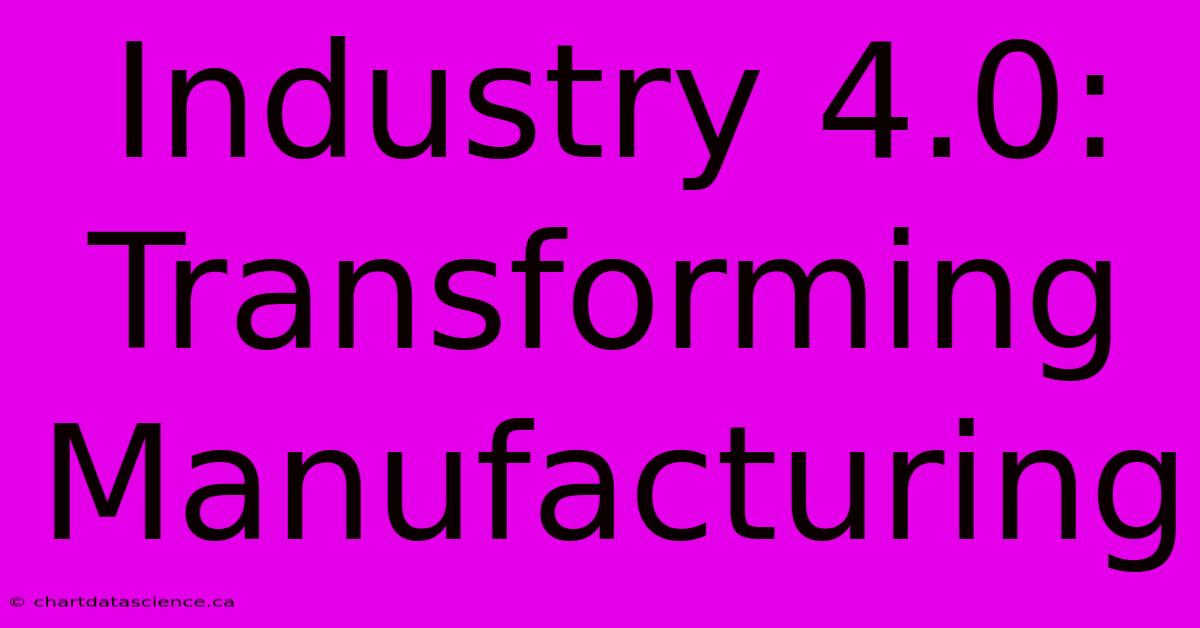Industry 4.0: Transforming Manufacturing

Discover more detailed and exciting information on our website. Click the link below to start your adventure: Visit My Website. Don't miss out!
Table of Contents
Industry 4.0: Transforming Manufacturing - The Future is Now
You hear it everywhere: Industry 4.0, the fourth industrial revolution. It's the buzzword on everyone's lips, but what does it actually mean? How is it changing the game for manufacturing? Let's break it down.
Imagine a factory where machines talk to each other, robots learn from experience, and data is king. This is the vision of Industry 4.0. It's about using cutting-edge technologies like artificial intelligence (AI), Internet of Things (IoT), big data analytics, and cloud computing to create smart factories. Think automation on steroids!
The Power of Smart Factories
What's so great about smart factories? Well, for starters, they're incredibly efficient and productive. Imagine machines that can self-diagnose problems, order parts on their own, and even adjust production lines to meet changing demand. That's the power of Industry 4.0 in action.
But it's not just about speed and efficiency. Smart factories are also incredibly flexible and adaptable. They can easily switch between different production runs, customize products on demand, and even experiment with new designs and materials. This flexibility allows manufacturers to respond to market changes faster than ever before.
The Benefits of Industry 4.0
So, what are the real-world benefits of Industry 4.0?
- Improved quality: AI-powered quality control systems can identify defects early on, reducing waste and ensuring higher product quality.
- Reduced costs: Automation and optimization lead to lower labor costs, improved resource utilization, and reduced downtime.
- Increased productivity: Smart factories can produce more goods with fewer resources, thanks to streamlined processes and optimized workflows.
- Enhanced customization: Consumers are demanding personalized products, and Industry 4.0 makes mass customization a reality.
- Improved safety: AI and robotics can take over dangerous tasks, reducing the risk of accidents and injuries in the workplace.
Challenges and Opportunities
While Industry 4.0 offers incredible opportunities, it also presents some challenges:
- Massive investments: Implementing these technologies requires significant upfront investments in new equipment, software, and training.
- Data security: Protecting sensitive data from cyberattacks is critical in a connected factory environment.
- Skilled workforce: A new generation of workers needs to be trained in data analytics, AI, and robotics to manage these advanced systems.
The good news is, these challenges can be overcome with careful planning and investment. Governments and industry leaders are collaborating to develop training programs and cybersecurity standards, paving the way for a successful Industry 4.0 revolution.
The Future of Manufacturing
Industry 4.0 is not just a trend; it's a fundamental shift in the way we manufacture goods. As technology continues to evolve, we can expect even more incredible innovations in the years to come.
Imagine personalized medicine manufactured on-demand, self-driving cars built with near-zero waste, and sustainable manufacturing processes that minimize environmental impact. This is the exciting future of manufacturing that Industry 4.0 is shaping.
The time to embrace Industry 4.0 is now. It's not just about staying ahead of the competition; it's about building a smarter, more sustainable, and more innovative future for everyone.

Thank you for visiting our website wich cover about Industry 4.0: Transforming Manufacturing. We hope the information provided has been useful to you. Feel free to contact us if you have any questions or need further assistance. See you next time and dont miss to bookmark.
Also read the following articles
| Article Title | Date |
|---|---|
| Phoenix Suns New Direction Under | Oct 24, 2024 |
| Liverpool Player Ratings Post Leipzig Game | Oct 24, 2024 |
| Chiefs Hope Hopkins Fills Super Bowl Gap | Oct 24, 2024 |
| Backlash Forces Roma Michael To Delete Post | Oct 24, 2024 |
| Francine Proses 1974 A Brooklyn Rail Essay | Oct 24, 2024 |
